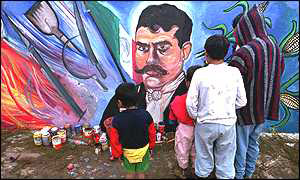
|
 |
 |
 News Around the Republic of Mexico | February 2008 News Around the Republic of Mexico | February 2008  
Zapatistas Lose Supporters in Mexico
 Manuel de la Cruz - Associated Press Manuel de la Cruz - Associated Press
go to original


| | Refugees in Polho look at a mural of Emiliano Zapata, founder of the Zapatista movement. | | |
Polho, Mexico - Nearly 200 families have abandoned the Zapatista rebel movement in one of its strongholds, turning to the government for aid at a time when the insurgents are complaining about the loss of outside support.

On Wednesday, each family received initial payments of $43 in a ceremony with Salvador Escobedo, a top official with the federal government's Social Development Department. The government is promising similar payments every two months, as well as a school and medical center.

The ceremony in Polho, long a backbone of the Zapatista movement, appeared to be the most prominent desertion from the insurgency since 2004, when about 400 families in the unofficial rebel capital of La Realidad broke away to accept government help, dividing the village in two.

The rebels have forbidden any aid from state or federal officials that they regard as illegitimate. Instead, they have created a series of self-declared autonomous communities such as Polho with their own schools, clinics and aid networks.

Community leader Javier Luna said the families decided to abandon the insurgents because they needed a government school, access to better medical care and other essentials.

They apparently will continue to live in the village of several thousand people, where rebels and non-rebels will go to different schools and clinics — a pattern in several other towns.

The Zapatista rebels staged an armed uprising in 1994 in the southern state of Chiapas, and built an international following. After initially battling the Zapatistas, the government turned to offers of negotiations and aid, which have gradually eroded rebel support in many communities.

In December, Zapatista leader Subcomandante Marcos said he was withdrawing to the shadows, ending nearly two years of public appearances aimed at bolstering a grass-roots leftist movement across Mexico.

In making the announcement, he complained that the once widespread national and international support for the Zapatistas has been "insignificant or null" recently. | 
 | |
 |



